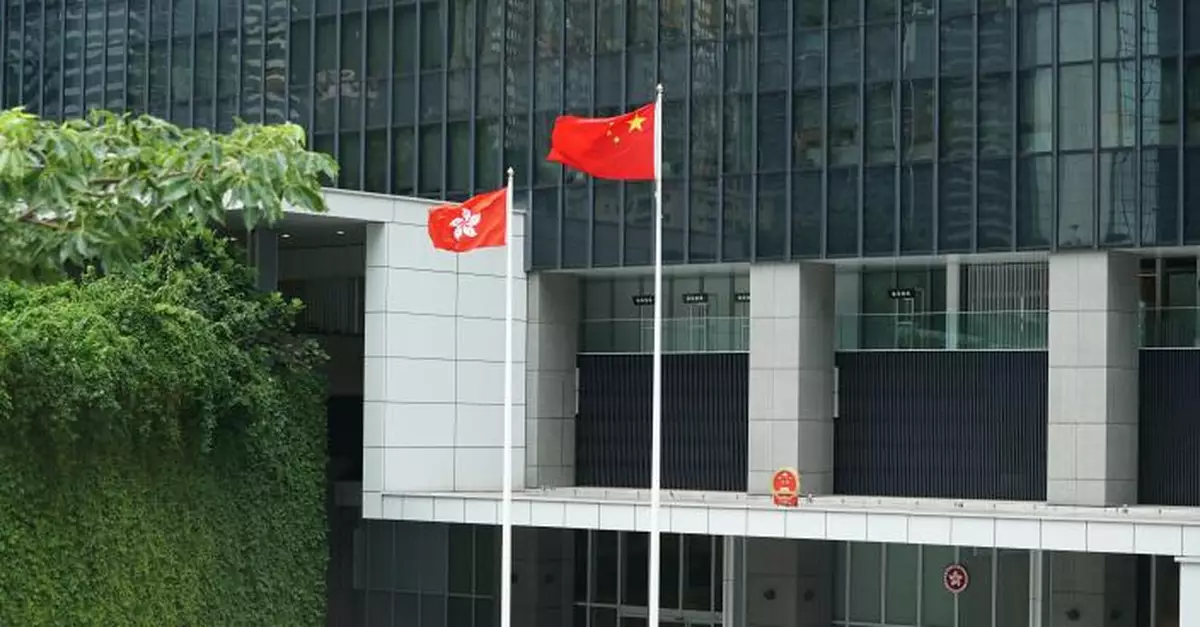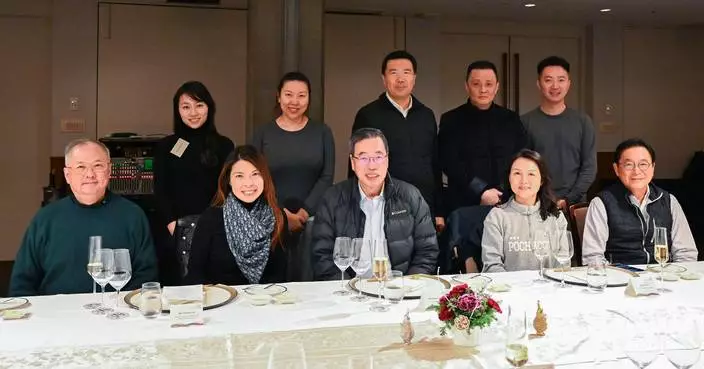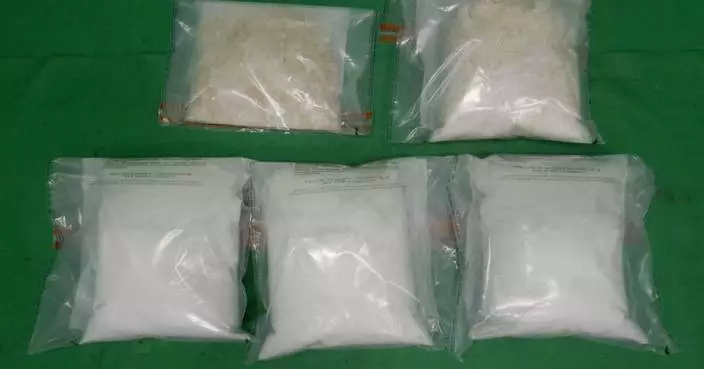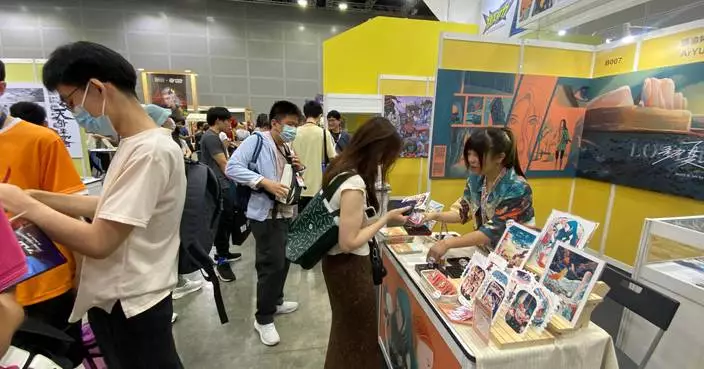HKSAR Government strongly disapproves of and rejects smears by "Media Freedom Coalition" against press freedom in Hong Kong
The Government of the Hong Kong Special Administrative Region (HKSAR) today (September 10) strongly disapproved of and rejected the fact-twisting remarks and baseless smears by "Media Freedom Coalition", whose members are claimed to be from foreign countries including the United States and the United Kingdom, against the verdict of a "conspiracy to publish and/or reproduce seditious publication" case, the safeguarding of freedom of the press, etc, in the HKSAR.
A spokesman for the HKSAR Government said, "We have emphasised time and again, and it is necessary to reiterate that Hong Kong citizens enjoy freedom of the press and freedom of speech as protected under the Basic Law and the Hong Kong Bill of Rights. In fact, the Hong Kong National Security Law (NSL) and the Safeguarding National Security Ordinance clearly stipulate that human rights shall be respected and protected in safeguarding national security. The rights and freedoms, including the freedoms of the press, of speech and of publication, enjoyed by Hong Kong people under the Basic Law and the provisions of the International Covenant on Civil and Political Rights (ICCPR) and the International Covenant on Economic, Social and Cultural Rights as applicable to the HKSAR, are protected in accordance with the law."
The spokesman stressed, "Like all other places in the world, such rights and freedoms are not absolute. Journalists, like everyone else, have an obligation to abide by all the laws. Their freedom of commenting on and criticising government policies remains uninhibited as long as they do not violate the law. The court, in its reasons for verdict, has analysed in detail the duties and responsibilities of the media, specifically highlighting that, according to Article 19(3) of the ICCPR, when the media and relevant personnel publish opinions, information and articles, they must observe and discharge 'special duties and responsibilities', including protection of national security or public order.
"The reasons for verdict have also pointed out clearly that the ideology of Stand News was localism which excluded China, and that it even became a tool to smear and vilify the Central Authorities and the HKSAR Government during the 'anti-extradition amendment bill incidents'. The court found that the relevant articles, without any objective basis, attacked the NSL and the Crimes Ordinance (Cap. 200) and relevant law enforcement and prosecutorial process; spread hatred and anti-government sentiment with disinformation; attacked the law enforcement by the Police and glorified the behaviour of rioters - in other words, they were not based on facts.
"The court further cited precedents from the European Court of Human Rights regarding press freedom, pointing out that the European Convention on Human Rights does not guarantee a wholly unrestricted freedom of speech even with respect to press coverage on matters of serious public concern. The most crucial point is that journalists must act in good faith and on accurate factual basis and provide reliable and precise information in accordance with the tenets of 'responsible journalism' in order to enjoy the protection of their rights to freedom of speech and press freedom.
"In the past, the US and some Western countries had also carried out law enforcement actions against the dissemination of disinformation, incitement of hatred, and glorification of violence in their own countries. Recent examples include a British journalist reportedly being arrested by the UK police for allegedly violating the UK Terrorism Act while working on coverage related to Palestine. The disparagement of the HKSAR District Court's verdict by the relevant countries only exposes their double standards.
"Hong Kong is a society underpinned by the rule of law and has always adhered to the principle that laws must be obeyed and lawbreakers held accountable. The law enforcement agencies of the HKSAR have been taking law enforcement actions based on evidence and strictly in accordance with the law in respect of the acts of the persons or organisations concerned, which have nothing to do with freedom of the press, or the background of any person or organisation."
The spokesman said, "The HKSAR will continue to resolutely discharge the responsibility of safeguarding national security and effectively prevent, suppress and impose punishment for acts and activities that endanger national security in accordance with the law, and safeguard the rights and freedoms enjoyed by Hong Kong people in accordance with the law at the same time."
CHP reminds public on precautions against cold weather
The Centre for Health Protection (CHP) of the Department of Health (DH) today (December 22) reminded the public, particularly the elderly and people with chronic illnesses, to adopt appropriate measures to protect their health in view of the cold weather.
A spokesman for the CHP said that cold weather can easily trigger or exacerbate diseases, especially among the elderly and persons suffering from heart disease, respiratory illnesses or other chronic illnesses.
"Elderly people have less insulating fat beneath their skin to keep them warm, and their body temperature control mechanisms may be weaker. Their body may not be able to appropriately respond to thecold weather," the spokesman said.
Some senior persons may have decreased mobility, which can impair their ability to generate and conserve body heat. Chronic illnesses, such as hypertension, diabetes and endocrine disorders, may undermine the health of elderly people and lower their metabolic rate, subsequently causing their body to generate less heat. Persons with chronic illnesses, such as chronic respiratory illnesses or heart disease, are vulnerable to disease aggravation due to cold weather.
The CHP reminded the public, in particular the elderly and persons with chronic illnesses, to adopt the following preventive measures:
Take note of the weather forecast. Wear warm clothing, including hats, scarves, gloves and socks, accordingly;
Consume sufficient food to ensure adequate calorie intake;
Perform regular exercise to facilitate blood circulation and heat production;
Stay in a warm environment and avoid prolonged outdoor exposure;
Use heaters with care and maintain adequate indoor ventilation; and
Seek medical advice if feeling unwell.
In addition, the public should avoid alcoholic beverages.
"Drinking alcohol cannot keep you warm. Alcohol accelerates the loss of body heat through dilated blood vessels, resulting in chilling instead," the spokesman said.
"Parents should ensure that babies are sufficiently warm, but it is also important to keep babies relatively lightly clothed to avoid overheating them," the spokesman added.
Parents should observe the following safety measures when putting their children to bed:
Keep the room well ventilated and at a comfortable temperature;
Always place babies on their backs to sleep. Leave their heads, faces and arms uncovered during sleep;
Babies do not need pillows. Place babies on a firm and well-fitted mattress to sleep. Avoid soft objects, pillows and loose bedding;
Let babies sleep in a cot placed near their parents' bed; and
Maintain a smoke-free environment.
In addition, many respiratory pathogens, including influenza and SARS-CoV-2, may have increasing activity and community transmission during winter. Seasonal influenza vaccination is recommended for all persons aged 6 months or above, except those with known contraindications. Persons at higher risk of getting influenza and its complications, including the elderly and children, should receive seasonal influenza vaccinations early. Please see details of the vaccination schemes on theCHP's website.
A person who gets influenza and COVID-19 at the same time may be more seriously ill and would have a higher risk of death. It is important for elderly persons, especially those residing in residential care homes, to receive both a seasonal influenza vaccination and a COVID-19 vaccination. They should also receive an additional booster against COVID-19 according to recommendations as soon as possible. The public should also maintain good personal and environmental hygiene against respiratory illnesses and note the following:
Surgical masks can prevent transmission of respiratory viruses from ill persons. It is essential for persons who are symptomatic (even if having mild symptoms) to wear a surgical mask;
Wear a surgical mask when taking public transport or staying in crowded places. It is important to wear a mask properly, including performing hand hygiene before wearing and after removing a mask;
Avoid touching one's eyes, mouth and nose;
Wash hands with liquid soap and water properly whenever possibly contaminated;
When hands are not visibly soiled, clean them with 70 to 80 per cent alcohol-based handrub;
Cover the mouth and nose with tissue paper when sneezing or coughing. Dispose of soiled tissue paper properly into a lidded rubbish bin and wash hands thoroughly afterwards;
Maintain good indoor ventilation;
When having respiratory symptoms, wear a surgical mask, refrain from work or attending classes at school, avoid going to crowded places and seek medical advice promptly; and
Maintain a balanced diet, exercise regularly, take adequate rest, do not smoke and avoid overstress.
Food-borne diseases, particularly those linked to hotpot cuisine, are also common in cold weather. The following preventive measures should be taken:
Wash hands before handling and consuming food;
Do not patronise unlicensed vendors or those with poor hygienic standards while selecting food;
Wash and cook all food thoroughly;
Vegetables should be washed thoroughly in clean running water before cooking and consumption. When appropriate, scrub vegetables with hard surfaces with a clean brush to remove dirt and substances, including pesticide residues and contaminants, from surfaces and crevices;
Shrimps should be fully cooked until the shells turn red and the flesh turns white and opaque;
For shellfish such as scallops and geoduck, scrub the shells thoroughly and remove internal organs;
Do not eat any undercooked freshwater aquatic products. To ensure that the food is thoroughly cooked, the centre of the food should reach a temperature of at least 75 degrees Celsius so as to destroy pathogen;
Most hotpot ingredients should be stored in a refrigerator at 4 degrees C or below, while frozen food should be stored in a freezer at -18 degrees C or below;
Never use raw eggs as a dipping sauce for hotpot; and
Use different sets of chopsticks to handle raw and cooked food to avoid cross-contamination.
In addition, when using fuel-burning appliances, especially in indoor areas, the public should ensure adequate ventilation to avoid harmful exposure to carbon monoxide (CO) and prevent CO poisoning.
For more health information, the public may call the DH's Health Education Infoline (2833 0111) or visit theCHP's websiteandFacebook Fanpage.
The public may also call Dial-a-Weather (1878 200) or visit thewebsite of the Hong Kong Observatoryfor the latest weather information and forecasts, or itspage on Weather Information for Senior Citizens.








